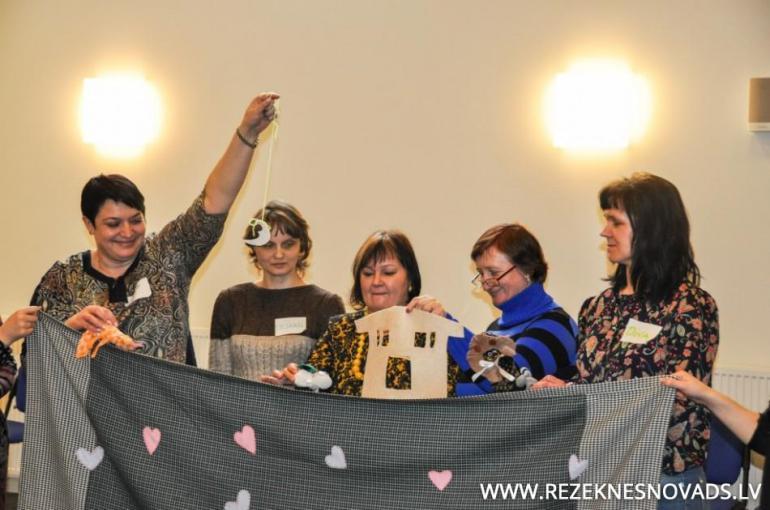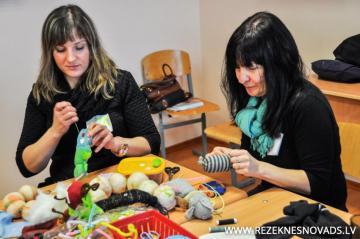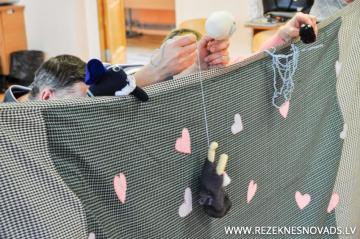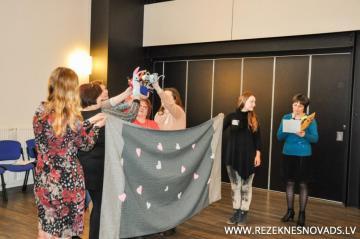
The methodology of global education until now was mostly developed for Elementary Schools and Secondary Schools, however, there are also some materials envisaged for preschool educational institutions and primary schools.
The methodology of global education until now was mostly developed for Elementary Schools and Secondary Schools, however, there are also some materials envisaged for preschool educational institutions and primary schools. Having examined the existing materials, we can draw a conclusion that most widely in these materials has been viewed the following theme of global education: environment and sustainable development. However, there are also such themes as intercultural issues, migration, tolerance, education for peace. The materials offer not only different methods and ideas for activities how to work with these themes, but also theoretical introduction. Some of these materials include activities that are envisaged not only for preschool educational institutions and primary schools, but also for elementary schools and secondary schools. Thus the educators themselves shall evaluate, which of these activities are appropriate for the age group they are working with. One of the materials developed specially for little children is “Methodological Material of Eco-schools for Preschool Educational Insitutions” (Mangule, 2008), published by “Foundation for Environmental Education”. At the beginning of the material there has been provided a brief introduction to the Program of Eco-Schools and it is continued by description of the themes of the Program of Eco-Schools of Latvia, offering both theoretical explanation of themesand different ideas for activities. Taking into consideration that for the preschoolers it is easier to understand the world through imagination and global thinking, there are several activities offered in this material that activates such imaginative thinking – different stories and questions for rethinking about these stories, role-plays, ideas for handicraft classes, experiments, games and plays.
Society “Humana People to People in Latvia” (HPPL) has developed 3 materials that are envisaged for preschool educational institutions and primary schools and cover the following issues: intercultural issues, environment and sustainable development. While developing materials of global education, HPPL applies the approach that combines different ideas for creating handicraft and drama elements (theatrical games, staging of puppet performance, creating and telling of stories). The materials developed by society are the resources that the educators can use at their own discretion and enrich them with their own ideas. HPPL has developed the following matrials: book “Rokas lelles stāsta Āfrikas bērnu stāstus” ( Puppets tell the Stories of African Children ; in Latvian) (Humana People to People in Latvia, 2009) that acquaints the children and adults with the African traditions of telling stories and the world seen by children in Africa – filled with different animals and interesting events, thus enabling to see other cultures on a brpader scale. Alonside with this material there are methodological guidelines prepared for teachers with recommendations how to use the book, when working with the children at preschool educational institutions and primary schools (Humana People to People in Latvia, 2011). The third developed material is “Cimdu Dukša un Zeķu Zaķa neparastais ceļojums” ( Amazing Adventures of GloveDoggy and SockHare ; in Latvian) (Lauriņa, 2011) that encourages the children to think about the environmental issues and offers different ideas how to make toys from materials that are no more used.
As it was mentioned above, some materials published in Latvia on global education and envisaged for preschool educational institutions and primary schools, comprise also activities for older children. One of such materials is “Education for Changes: A Guide for Teaching and Studying of Sustainable Development” (Jutvika, 2008), published by Baltic University Programme and Uppsala University. This material is a teacher’s guide – practical guidelines in order to teach and study for sustainable development starting from a primary school up to an elementary school; the activities are envisaged for children of age 6-14.
The State Inspectorate for Protection of Children’s Rights has published the material on tolerance “Methodological Material for the Facilitation of Tolerance at an Educational Institution” (Muceniece, 2008). This material is appropriate for working with children at a preschool educational institution and children at a primary school, as well as for working with older children. The aim of the material is to develop understanding of intolerance, to facilitate the insight into the reasons of intolerance, to acquire knowledge how to react to the feelings and thoughts of a victim and those of a wrongdoer, as well as to develop understanding that everybody has an opportunity to take part in the elimination of intolerance. The material provides also practical methods what to do, if intolerance has developed. The theme of this material – “tolerance” – is essential within the context of global education, especially when speaking about education for peace and how we can facilitate common understanding of peace and its meaning within a broader context by reducing intolerance at a local level.
One more material of global education has been published by Education Development Centre (EDC) – “Methodological Material of Global/Developmental Education” (IAC, 2011). This material comprises different activities on globalization, environment, human rights, which are envisaged for preschoolers and primary school pupils, however, most of the activities included in the materials are for elementary school pupils and secondary school students.
An essential result of the project “Global Schools” implemented by Rezekne Amalgamated Municipality local government is the development of the methodological material of global education for preschool educational institutions and primary schools that could be used, when working within the context of Rezekne and Latvia. Isight into the existing materials help to see and analyze what has been already done and, on the basis of that, the team of project experts will continue to work in order to publish a new material, which would be appropriate for the educational environment of Latvia. The methodological material developed within the framework of project will be available in the Internet with an opportunity to download to all interested parties.
Ruta Kronberga, Project Global schools expert.
1. Humana People to People in Latvia, (2009). Rokas lelles stāsta Āfrikas bērnu stāstus ( Puppets tell the Stories of African Children ). Material is available at: https://hppinlatvia.files.wordpress.com/2011/12/rokas-lelles-stc481sta1.pdf
2. Humana People to People in Latvia, (2011). Rokas lelles stāsta Āfrikas bērnu stāstus. Metodiskas vadlīnijas nodarbību plānošanā un īstenošanā ( Puppets tell the Stories of African Children. Methodological Guidelines for the Planning and Delivering of Classes ). Material is available at: https://hppinlatvia.files.wordpress.com/2011/12/metodiskas-vadlinijas_latviesu-val.pdf
3. Education Development Centre (2011). Metodiskais materiāls globālajā/attīstības izglītībā ( Methodological Material of Global/Developmental Education ). Material is available at: http://www.skolaskasateliti.lv/files/metodiskais_materials_pr2.pdf
4. Jutvika G. (2008). “Izglītība pārmaiņām: ilgtspējīgas attīstības mācīšanas un mācīšanās rokasgrāmata” ( Education for Changes: A Guide for Teaching and Studying of Sustainable Development ). Baltic University Programme, Uppsala University. Material is available at: http://videsskola.lv/attachments/020_Rokasgramata.pdf
5. Lauriņa I. (2011). CimduDukša un ZeķuZaķa neparastie piedzīvojumi ( Amazing Adventures of GloveDoggy and SockHare ). Humana People to People in Latvia. Material is available at: http://hpplatvia.com/index.php/2015/08/05/cimduduksa-draugi/
6. Mangule I. (2008). Ekoskolu metodiskais materiāls pirmsskolas izglītības iestādēm ( Methodological Material of Eco-Schools for Preschool Educational Institutions ). Foundation for Environmental Education. Material is available at: http://www.videsfonds.lv/documents/ekoskolu-metodiskais-materi-ls-pii.pdf
7. Muceniece I. (2008). Metodiskais materiāls iecietības veicināšanai izglītības iestādē ( Methodological Material for the Facilitation of Tolerance at an Educational Institution ). The State Inspectorate for Protection of Children’s Rights. Material is available at: www.bti.gov.lv/in_site/tools/download.php?file=files/text/ieciet.veic.izgl.iest.pdf


